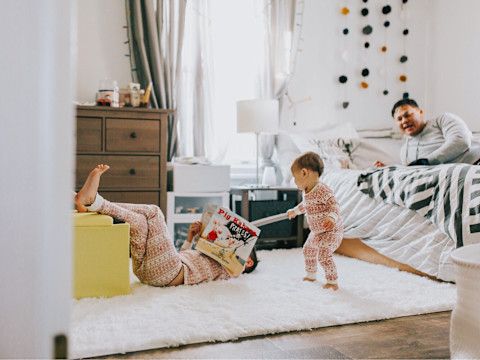6 Ways To Optimize The Time You Have With Your Kids & Create Lasting Memories

Ten minutes ago I was sitting here writing this when my 3-year-old daughter climbed onto my lap. My goal was to have this article done yesterday, so my initial reaction was that she was getting in my way. And then the irony dawned on me—this is l-i-t-e-r-a-l-l-y an article about spending quality time with your kids—and I closed the laptop and devoted my full attention to snuggling her.
Even though work and our other adult responsibilities feel weighty, overwhelming, and important, once you have children, there are even more significant deadlines and milestones in your life—like teaching our kids about dinosaurs, the tooth fairy, and how to ride a bike; experiencing (and surviving) that dreaded teenage rebellion, when they decide we're monsters; and the moment we drop them off at college, then go ugly cry in our car for an hour.
And the truth is, that stretch between newborn and empty-nest-ugly-cry is a blink. In the words of the venerable sage Ferris Bueller, "Life moves pretty fast. If you don't stop and look around once in a while, you could miss it."
Here, pulling from my experience as a mom and holistic psychiatrist, I'm going to give you a few tips on how to not "miss it" with your kids (even if life's crazy) so you can create memories and a bond that lasts:
Lower your standards.
First of all, lower your expectations for yourself as a parent. I was an amazing aunt, but by most measures, I'm a far "inferior" mother—and that's OK. When you're a casual acquaintance to a kid, you want to slurp up any sip of connection and affection you can manage. With your own kids, the body-invading-endless-neediness hits you like water from a fire hose, and you're drowning. If we have some image of ourselves always doing blissed-out yoga with our kids or never being that parent on their phone at the playground, we're setting ourselves up for disappointment. It's not possible to drink from a fire hose, and it's not possible to be a perfect parent. But there are techniques for how to enjoy and bond with our kids.
Know that the golden moments of connection happen on their schedule, not yours.
I want to bond, connect, snuggle, and be a perfectly present parent on the rare lazy Saturday morning when I have nothing to do but be completely available for my daughter. But in those moments, she couldn't care less that I'm there. Instead, she seems to want to connect any time I have a work deadline, when I'm running out the door to catch a flight, or those spiritual moments where the water is boiling over on the stove at the same time the phone is ringing and someone's at the door. The art of present parenting is recognizing that the moments when she wants to connect are a precious gift occasionally worth missing deadlines and flights for. So what do you do? You just close your laptop, even though it feels like the weight of the world is in your inbox. It turns out, the relentless to-do's of life are not real life. Your child, that's the real thing that's happening here.
Have the hard conversations.
One night I was tucking my daughter in for bed. She told me there was a girl in school she wanted to be friends with, who didn't like her. Gulp. It would have been easy to say, "Oh, I'm sure she likes you," or, "Well she's wrong for not liking you, so there," or, "Don't worry, you'll eventually make friends," or some other dismissive statement designed to ease my discomfort with this heavy topic.
Instead, I went right into the heart of darkness with her. We got into the nitty-gritty of how she's feeling, of how it hurts, the feeling of rejection, and wondering why this girl doesn't like her. I shared experiences from my own life when I went through the same thing (there's been no shortage). I gave her concrete examples of times when I wanted to be friends with somebody and they didn't feel the same way. I also presented the fact that at this point in my life, I have friends I love who love me, and my life is full and satisfying.
But I didn't shy away from what she was really feeling. I gave her space to be authentic and vulnerable yet seen and accepted by me. I demonstrated that I can tolerate her big feelings and she can too. As parents, we can model tolerating big feelings, and this is a gift to our kids who are about to go through all the challenges of life. If you're a parent, read your Brené Brown, and start applying it now, even if you have a toddler.
Outsource some of your to-do's.
My primary suggestion for shifting toward being able to be more present with your kids is to outsource the to-do's as much as you can. I know this sounds like unchecked privilege, but I think we need to get past the idea that this is a luxury. The fact is, we all spend money on things we don't need. I think the real reason we don't do this more readily is because women suffer from "Human Giver Syndrome" (to use a term from Burnout by Emily and Amelia Nagoski). We don't feel worthy of asking for what we need or having our needs met. But when the relentless treadmill of to-do's starts to drive you out of your mind, it's time to outsource.
So, my suggestion is to review your budget and reallocate some funds toward outsourcing effectively, such as grocery delivery, a baby sitter who can help with school drop-off and pick-up, help with cleaning and laundry, or even a TaskRabbit to help with cooking. The holy grail is to have a baby sitter who helps cook and clean while your kid sleeps and you get a break. Dream big!
Put down the phone.
I could go into a whole long explanation, but honestly, all that needs to be said here is this: Put down the phone. It's ingeniously engineered to steal our attention. Unfortunately, human children, as charming as they are, may need a software upgrade before they're able to compete with Instagram. So, if your phone is getting in the way of your ability to be present with your kids (which—spoiler alert—it is), take steps to curb the habit: Use the screen time function, delete certain social media apps, or just throw the thing out the window. These addictive devices are robbing our kids of fully present parents.

Create a family culture of goofy, vulnerable dance and play.
The good news for busy parents is that it isn't the quantity of time with our kids that has the biggest impact; it's the quality. My favorite way to create memorable moments is to put on goofy music and dance as a family. We didn't realize how much our daughter appreciated this until one rainy Sunday afternoon we were midway through an award-winning performance of "How Far I'll Go" from Moana in our living room (we were all in costume, NBD) when a FaceTime call came through from some good friends. My husband and I thought, obviously we'll pause the music and answer that. Our daughter, however, considered this the biggest buzzkill of her life. These moments of goofy shared playfulness are the moments when you weave the fabric of your family culture. Guard them like the crown jewels, no matter how much you want to take that call.
As busy parents, we're bound to feel guilt and disappointment at missing certain moments with our kids. But making sure we're truly present when we're with them is the best way to ensure that the time we share together is optimized to its fullest potential. Whether it's putting down the phone, closing the laptop, or asking for help with laundry, these small steps can make the biggest difference in creating connections and memories that last and making sure we don't miss this most precious blink of an eye.

Ellen Vora, M.D. is a board-certified psychiatrist, acupuncturist, and yoga teacher, and she is the author of the No. 1 bestselling book The Anatomy of Anxiety. She takes a functional medicine approach to mental health—considering the whole person and addressing imbalance at the root. Vora received her B.A. from Yale University and her M.D. from Columbia University.

Ellen Vora, M.D. is a board-certified psychiatrist, acupuncturist, and yoga teacher, and she is the author of the No. 1 bestselling book The Anatomy of Anxiety. She takes a functional medicine approach to mental health—considering the whole person and addressing imbalance at the root. Vora received her B.A. from Yale University and her M.D. from Columbia University.
